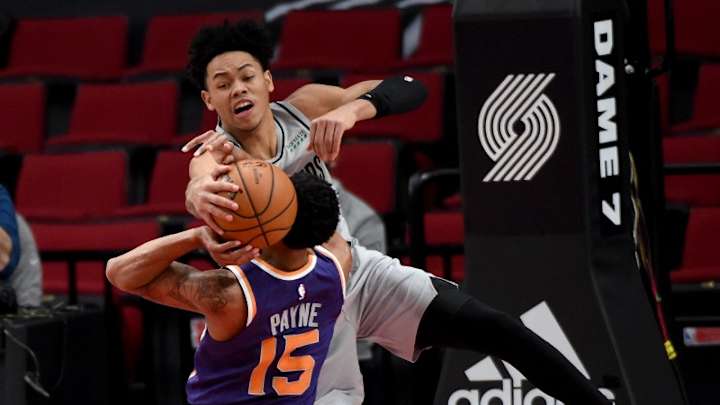Anfernee Simons' Peaks and Valleys Were On Full Display Against the Suns

Anfernee Simons was making a statement.
Fresh off becoming the first player in Trail Blazers history to win the dunk contest, the third-year guard played some of his best basketball of the season against the Phoenix Suns on Thursday. Simons' breakout game was coming at the perfect time, too, as Terry Stotts will soon be forced to make some very difficult rotation decisions when C.J. McCollum and Jusuf Nurkic finally return to the floor.
He was so good in the second quarter, in fact, that Stotts broke from his established rotation to keep him in the game until intermission. Simons' 20-footer as the first-half clock expired came a blip too late, but did nothing to blunt encouragement gleaned from his both awesome early performance against one of the best teams in the league.
Simons' aggressive mindset was obvious from his first possession, when he caught a kickout from Rodney Hood on the move, took one dribble and lofted a tough floater over Dario Saric – just his third score from two-point range in the last 10 games.
Among the countless encouraging aspects of Simons' second-quarter play was his comfort running the show. Hood has been the Blazers' de facto second point guard in reserve units of late, shifting Simons to a more natural role off the ball. But he was Portland's no-doubt floor general for a majority of his minutes versus Phoenix, bringing the ball up the floor, initiating offense and even sometimes barking out orders to teammates.
The nuance Simons shows on the possession below, rejecting the screen and dribbling to manipulate Dario Saric before passing back to a popping Nassir Little, is exactly what he needs to show on a more regular basis to become more comfortable at point guard. Don't discount the importance of Simons ensuring Little does his job by setting a quick cross screen for Hood, either.
Simons has often been criticized for failing to apply to his explosive athleticism in games – calls that will no doubt grow louder after his jaw-dropping dunk-contest exploits. He didn't pressure the rim much against Phoenix, but consistently pushed the ball up the floor when the opportunity presented itself, getting the Blazers' offense moving early in the shot clock.
Putting that type of stress on the defense is low-hanging fruit for Simons, an aspect of his game that can be coached. What's always made him a tantalizing prospect is his natural ease shooting off the bounce, like on this pull-up triple after taking a dribble hand-off from Enes Kanter. Look how Simons gets into that action, attacking baseline before reversing course and immediately moving into the next option.
This might as well be Damian Lillard.
Portland won its second-quarter minutes sans Lillard 22-14, a shocking margin considering the second unit's struggles since McCollum and Nurkic went down. The Blazers entered the fourth quarter up by four, and Simons' stellar first-half play suggested they'd at least be able to survive Lillard's stint on the bench in the game's final stanza.
Wrong.
Portland lost its lead barely 90 seconds into the fourth quarter. By the time Lillard returned with 8:44 remaining, the Blazers four-point lead had turned into a four-point deficit – a sudden downturn that had Simons' fingerprints all over it.
The broadcast was too busy with a replay to show the entirety of a possession that ended with Cam Payne hitting a wide-open three, giving Phoenix its first lead of the fourth quarter. But Payne was Simons' primary assignment, and Carmelo Anthony's clear, pointed frustration with Simons indicates he was responsible for Portland's breakdown.
To be fair, Simons was hardly the only player on his team to miscommunicate potential switches. That was an ugly bugaboo for Portland from the opening tip of Thursday's game. The frequency with which the Blazers made those defensive mistakes and similar gaffes related to game-planning is owned at least partially by Stotts and the coaching staff.
But this inexplicable turnover, obviously, falls on Simons' shoulders alone.
Simons' stint was over less than a minute of game-time later, when Stotts cut Lillard's time on the bench short. The former reappeared late in the fourth quarter, when the game was already out of reach.
The starts and stops of Simons' development are to be expected. It's naive to assume that his obvious, sustained progress won't be interrupted by the simple foibles that have plagued Simons' career to date, even in the same game.
But there's no getting around the opportunity Simons missed against the Suns. McCollum will be back very soon, and Little burnished his case for a permanent rotation spot on Thursday with another dynamic performance off the bench. When the Blazers are fully healthy, there just won't be enough minutes to go around for both of Portland's young reserves.
Simons' talent level has never been a question. As the duality of his impact against the Suns made abundantly clear, though, Simons' considerable skills and athleticism aren't enough to overcome his damaging bouts of youth and inexperience.
